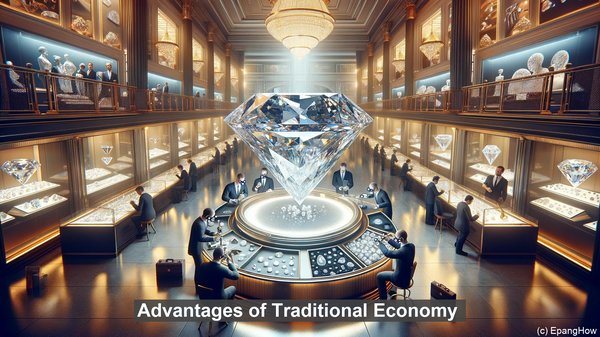Introduction: Unveiling the Economic Systems
Hello everyone! Welcome to our article on the intriguing world of economic systems. Today, we’ll be focusing on two prominent types: traditional economy and market economy. While both play a vital role in shaping societies, they differ significantly in their principles and functioning.
Traditional Economy: Embracing the Past
A traditional economy is deeply rooted in customs, traditions, and long-established beliefs. It’s often found in rural, agrarian societies, where the community’s collective decisions drive economic activities. Here, the roles and occupations are inherited, and the production methods remain unchanged for generations. Barter, rather than currency, is the primary medium of exchange.
Market Economy: The Power of Demand and Supply
In contrast, a market economy is driven by the forces of demand and supply. It’s a system where individuals and businesses make economic decisions based on their self-interest. The market, through the price mechanism, allocates resources and determines the production and consumption patterns. Private ownership, competition, and profit maximization are its defining features.
Distinct Features: A Comparative Analysis
When we compare the two, several distinctions emerge. In a traditional economy, the social fabric and community ties are crucial. Decisions are often made collectively, and the focus is on meeting the community’s needs rather than individual desires. In a market economy, individual choices and aspirations take center stage. The pursuit of profit and personal gain drives economic activities.

Advantages of Traditional Economy
Traditional economies have their own set of advantages. They promote social cohesion, as everyone has a defined role and responsibilities. The interdependence fosters a sense of unity. Additionally, since the production methods are time-tested, there’s often stability and predictability. The environment is also given importance, with sustainable practices being the norm.
Advantages of Market Economy
Market economies, on the other hand, offer a range of benefits. The competition fosters innovation and efficiency. Businesses strive to improve their products and services to attract customers. The price mechanism ensures that resources are allocated based on demand and supply. This flexibility and adaptability make market economies dynamic and responsive to changes.
Challenges: The Flip Side
No economic system is without its challenges. In traditional economies, the resistance to change can hinder progress. The lack of diversification and reliance on limited resources can lead to vulnerability. Market economies, while flexible, can also be prone to inequalities. The pursuit of profit may overlook certain societal needs, leading to disparities.

